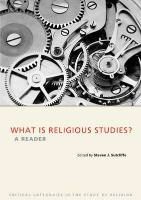Read more
Informationen zum Autor Steven Sutcliffe is Senior Lecturer in the Study of Religion at the University of Edinburgh. Klappentext The study of religion has never been more important. This volume describes and scrutinises major ways in which Religious Studies has been imagined in recent decades. Inhaltsverzeichnis General Introduction Part I: Orientation: Scope and Remit Introduction 1. Study of Religion(s), T. Thomas 2. Methods and Issues in the Academic Study of Religion, G. Alles Part II: Constitution: Identity and Demarcation Introduction 3. The Principles and Meaning of the Study of Religion, N. Smart 4. Historiography and Disciplinary Formation: the case of "Religious Studies", S. Sutcliffe 5. Interdisciplinarity in Religious and Women's Studies, D. Juschka 6. A Spatial Analysis of the Relationship between Theology and Religious Studies: Knowledge-power Strategies and Metaphors of Containment and Separation, K. Knott Part III: Interpretation: Communication and Understanding Introduction 7. "Religion" and "Religious Studies": No Difference At All, J. Z. Smith 8. Principles of Studying Religions, R. Gothoni 9. Discursive Study of Religion: from States of the Mind to Communication and Action, K. von Stuckrad 10. The Study of Religion as Corrective Reading, G. Flood Part IV: Explanation: Reduction and Causality Introduction 11. Is a Science of Religion Possible? H. Penner & E. Yonan 12. Basic Positions of Religionswissenschaft, K. Rudolph 13. Methodological Foundations of the Comparative History of Religions, W. Tyloch 14. Beyond thick descriptions and interpretive sciences: explaining religious meaning, D. Wiebe Part V: Deconstruction: Reflexivity and Critique Introduction 15. Religion, Religions and World Religions - Religious Studies: a critique, T. Fitzgerald 16. Secularism and the "iatrogenic" effect of studying religion, R. King 17. Postcolonial Reflections: challenges for Religious Studies, M. Joy 18. Outlaws or In-Laws? Queer Theory, LGBT Studies and Religious Studies, M. Wilcox Part VI: Intervention: Engaged and Applied Models Introduction 19. A Default of Critical Intelligence? The Scholar of Religion as Public Intellectual, R. McCutcheon 20. The Academy as Real Life: New Participants and Paradigms in the Study of Religion, J. Plaskow 21. The Task and Function of the Academic Study of Religion in the Face of Religious Diversity, E. Franke Conclusion Bibliography ...

